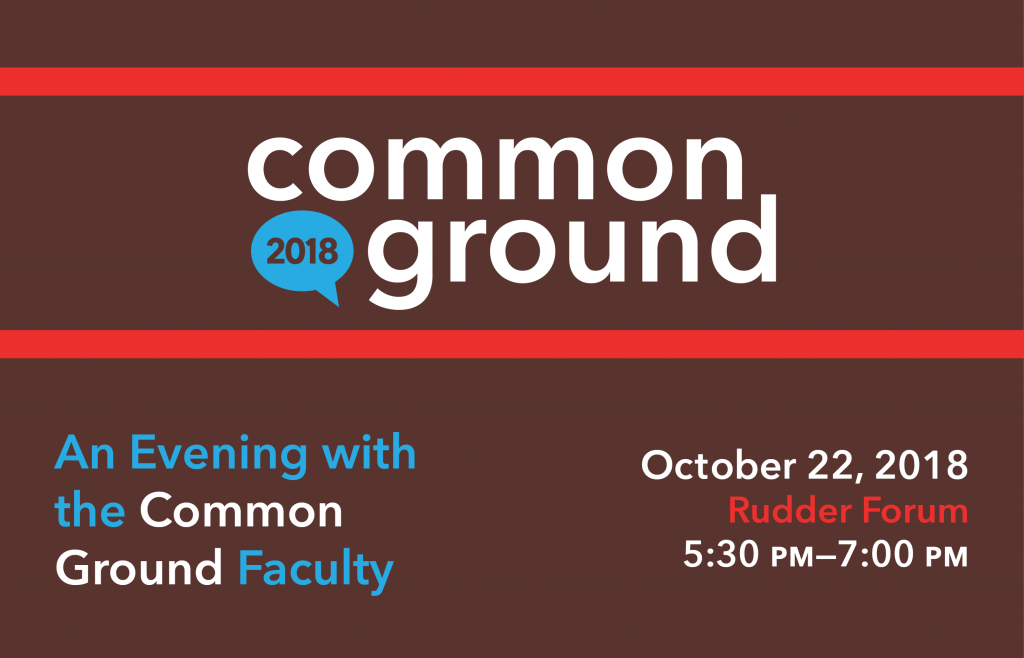Join us for the 2018 Common Ground Reading Initiative event
The College of Liberal Arts and the Aggie Agora proudly presents the 2018 Common Ground Reading Initiative on Monday, October 22, 2018, at 5:30 p.m. in Rudder Forum. Five faculty members will discuss the book from their various disciplines.

by Heather Rodriguez
The College of Liberal Arts and the Aggie Agora proudly present the 2018 Common Ground Reading Initiative on Monday, October 22, 2018, at 5:30 p.m. in Rudder Forum. This year, five faculty members will discuss the reading selection, #republic: Divided Democracy in the Age of Social Media by Cass R. Sunstein, from the perspective of their various disciplines and engage the audience in thought-provoking discussion: James Ball from the Department of Performance Studies, Daniel Conway from the Department of Philosophy, Johanna Dunaway from the Department of Communication, Catharina Laporte from the Department of Anthropology, and Timothy Woods from the Department of Sociology.
The college spoke with each Common Ground fellow to get an idea of what to expect from their presentations.
College of Liberal Arts: Describe how you’re going to tackle #republic from the viewpoint of your area of expertise?
Ball: I expect that my remarks will be on the ways we perform identity in the virtual public sphere of social media, and the promise and peril of our necessarily theatrical democratic institutions in the 21st century.
Conway: My remarks at the Common Ground event will center on the two main thrusts of Sunstein’s book: 1) His concern that our short-term interests, as illuminated and enlarged by the proliferation of social media, are often at odds with our long-term interests, including our interest in preserving our democratic way of life; and 2) His defense of the role of “serendipity” in aligning our short-term and long-term interests. In assessing the merits of Sunstein’s diagnosis and prescription, I will account for the pedagogical value of popular films in the genre of science fiction.
Dunaway: I plan to discuss how the book is an updated account of his original arguments in Republic.com, which was one of a few key works that set off a renewed interest in selective exposure theories and their consequences among political communication researchers. It shifted the focus of a significant proportion of political communication research such that in the time since much of the work has been focused on testing empirically the claims in the original book, many of which remain central to the new book, #republic. Though a lot of the empirical evidence this body of work has produced casts doubt on several of Sunstein’s assumptions and arguments, there’s no doubt his work had a major imprint on the subfield of political communication.
Laporte: Three main themes emerge from #republic by Sunstein that closely relate to the subjects covered in my class, ANTH/RELS 403 Anthropology of Religion: the people’s power to filter what they see; the people or person in power’s ability to filter what “the people” see; and the power of the common experience. Religion, often described as both “the social glue” and an instrument of power, plays a key role in all of these themes. In class, we read selected chapters from #republic with a holistic and critical eye.
Woods: As a sociologist who studies aging and regularly volunteers with my students to serve older community members, I hope to focus attention on two issues acknowledged but left unexplored by Sustein: (1) the importance of age on social media use and misuse and (2) the use of social media by young people to empower groups previously ignored or excluded from the public sphere (e.g., #MeToo, #BlackLivesMatter, #NeverAgain).
